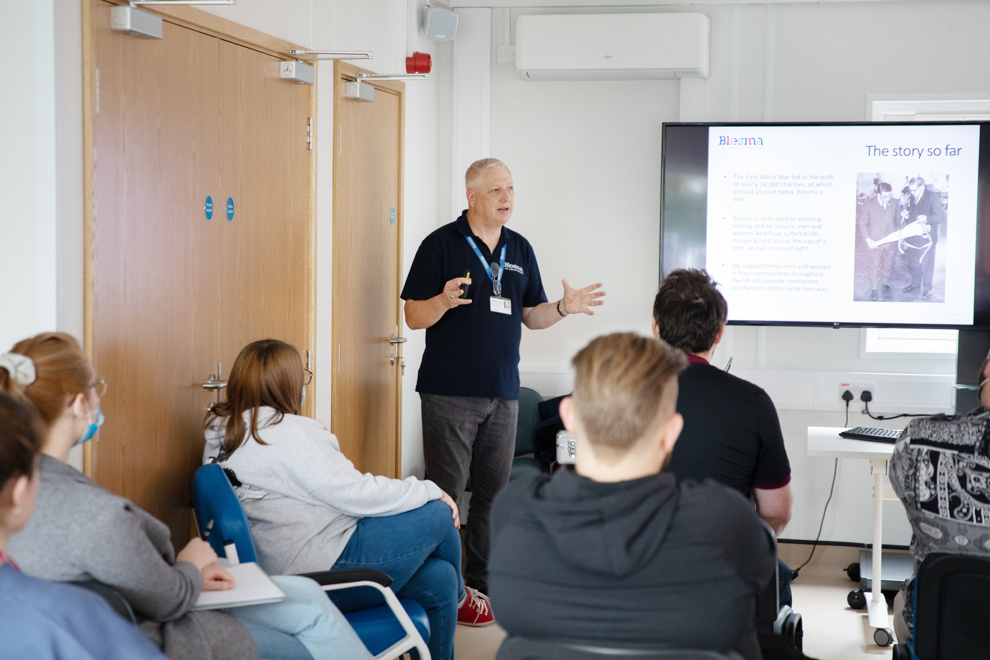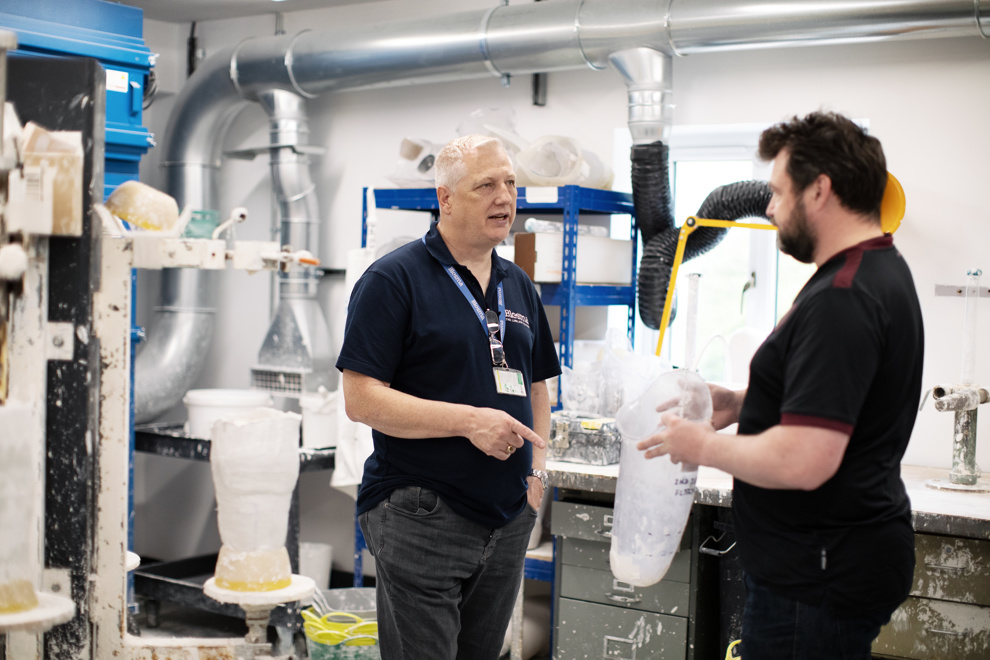The Association is on a mission to help NHS Limb centres understand the unique challenges faced by Military Amputees.
Limb Centres are crucial to the wellbeing of every amputee. They are run both by the NHS directly and by third party service providers who offer care on behalf of the NHS. The partnership between these organisations, the NHS and Blesma is vital in ensuring veterans receive the care they need.
Brian Chenier, Blesma’s Support Officer (Prosthetics), is the main link between the Limb Centres and the Association. He is undertaking a series of visits to facilities across the UK (there are 35 in England, five in Scotland, four in Wales and one in Northern Ireland) over the next 12 months to hold continuous professional development (CPD) sessions with key staff.
The aim is to increase awareness among Limb Centre staff about what the Association does and what its Members need. Brian recently visited Billericay Limb Centre, where he spoke with the centre’s Service Manager Alan Meyer and his multidisciplinary team. Billericay has 26 staff, including 10 prosthetists, and sees some 30 patients a day. It provides more than prosthetic care however, with veterans and civilian patients able to access a range of professional services from occupational therapy and mental health services, to physiotherapy and prosthetic care.
What’s the idea behind getting out to visit Limb Centres on behalf of Blesma?
Brian: Towards the end of lockdown, I was having more and more conversations with prosthetists who didn’t know who I was or what Blesma did. I knew I had to get out there, to physically see people, because there had been a significant churn of staff at some centres, and also because people simply forget. We know that almost every problem our Members have with their prosthetics can be dealt with through communication, and the best form of communication is face to face.
Alan: It’s very useful and incredibly important for our team to get a visit from Brian. His knowledge and information keep us up to speed with – and help us understand – the needs of the military community. But having a close working relationship with Brian is incredibly useful for our dealings with individual patients throughout the year, too. Brian can let us know about a Member’s requirements before he or she arrives, so we are prepared. That helps give
the veterans confidence that we can help them.
Brian: I’ve set a goal of visiting as many centres as I can this year, either with individual Members or to carry out the continuous professional development sessions. The idea is to reacquaint whole teams – the prosthetists, nurses, physios, doctors – with who Blesma are, what we do, who we support, how we support them, and what part they can play in that.

What are some of the more common misconceptions that Limb Centre staff sometimes have about veterans?
Brian: That all veterans have seen combat service, that all veterans are super fit and want to climb mountains, that
all veterans have benefitted from defence rehabilitation… This can lead to a breakdown in communication, and the
wider perception of a modern veteran can make Members feel as though they need to live up to something. I say in my talks that ‘veteran’ just gives you a clue as to someone’s job – not their mentality or physicality.
But veterans often have a different attitude towards getting things done…
Brian: They do. In the military, when someone is told to do something, the expectation is that it gets done. Veterans tend to be on time, and if they are kept waiting by someone else turning up late, it’s good to explain
why that has happened. That can be done through good communication in a waiting room, for example.
Alan: In general, military amputees are very motivated; they want to make progress and be the best that they can be. Veterans who have come through Headley Court or Queen Elizabeth Hospital have had intensive rehabilitation and have often been fitted with high-end prosthetic limbs. NHS Centres can lack the capacity to deliver intensive rehabilitation in the same way, so turnaround of new sockets or components may not be in line with what veterans have been used to.
Members can also make assumptions…
Brian: It works both ways. Our Members can sometimes think that the NHS is just trying to save money, but patient safety is the NHS priority. Some Members go into Limb Centres expecting a poor experience. They can
sometimes attend appointments feeling confrontational or submissive because of previous experiences.
Alan: I agree. From our point of view here at the Limb Centre, the key challenge is always managing expectations. Communication is vital to that. We have to be careful to work as a team because patients come in with complex problems; it’s rarely simply a case of fitting a prosthesis.
The patient might need psychological support, or fitness training, or wound dressing. They might have a specific muscle weakness, for example. It’s about understanding what is holding them back, their limitations, and what we can do to benefit them. It’s not just about giving them a prosthetic arm or leg.
How can the most common issues be avoided?
Alan: The best way to build a relationship that works is through familiarity and communication. A big part of that is to help the veteran get to know their clinician so that the professional is able to earn the patient’s trust. That has to happen over a period of time. For us, it’s all about getting to know the veterans as individuals.
Brian: Again, it’s about communication. I always try to explain to Members the value of being clear and assertive, to get across what they need, and to make sure the right conversation is had. The best way to do that is to go into an appointment with a script. Write down what’s wrong and what’s going right, so when there is limited time they can get all their points across.
Alan: It is very important that a patient comes in with a clear idea of what they want, but they must also be realistic. That said, we will try to move any mountain that needs to be moved.
So being proactive is key?
Alan: It’s all about collaboration, about understanding needs and expectations. Together, we can put plans in place to meet goals and make sure nothing is left to chance. And it’s important for us to be able to spread the word about all our services; such as our clinical support technician service, for example. That’s for people who have suffered breaks to their prostheses. A patient can come in and have things fixed or be seen on the day. What we can fix we will fix, otherwise we can order parts and fit them as quickly as possible.
Brian: For our Members, getting into the mindset of taking ownership of their own prosthetic provision so that they can get the best results is important. Rather than waiting for something to break, it is much better to be fully engaged in self-care. Contact your Limb Centre when you first notice a problem rather than three weeks later when it becomes urgent, for example, because they might not be able to fit you in quickly.
In general, is the relationship working well between Blesma and the Limb Centres?
Brian: Absolutely. On behalf of the Association and our Members I’d like to say thank you for everything the staff at all the Limb Centres do – particularly for what they did during Covid. They were brilliant.
Alan: From our point of view, we certainly appreciate what Blesma does. Having organisations like Blesma being part of national commissioning on prosthetics is important. They definitely help shape our service, and it’s vital that they are listened to.
If you are experiencing problems with your prosthesis or provision of prosthetics, please get in touch with Brian, BSO (Prosthetics), at Blesma Chelmsford on 07796 715908 or at bsoprosthetics@blesma.org, or you can visit www.blesma.org

We can help
We are dedicated to assisting serving and ex-Service men and women who have suffered life-changing limb loss or the use of a limb, an eye or sight. We support these men and women in their communities throughout the UK. Click the link below to find out the different kinds of support we offer.
Get Support
Leave a comment
Join fellow Members and supporters to exchange information, advice and tips. Before commenting please read our terms of use for commenting on articles.